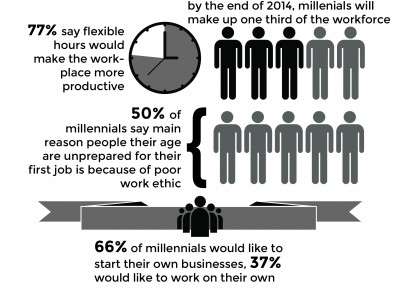
As members of the Millennial Generation make their way through college and into the workforce in large numbers, a Tuesday study revealed millennials’ perspective toward work and tackled some of the stereotypes about the generation.
The study, part of PreparedU Project at Bentley University, focuses on understanding how millennials work to better understand how to support them.
“Whether you like it or not, whether you’re a baby boomer and you’re sitting there frustrated with what you perceive as millennial attitudes that don’t meet with yours, they [millennials] are going to be the largest workforce in history,” said David Perry, chief marketing officer of Bentley. “They’re already shaping the workplace.”
Kevin Lang, an economics professor at Boston University, said starting dialogue about millennials entering and making it in the work place is important because of the impact the generation will have on society.
“People entering the workforce now have greater familiarity with new technology [and] social media. They learn in different ways because they have more access to electronic information than earlier generations,” Lang said. “Younger people are going to be more able to adapt to new technology. It changes the way people work rather than the personalities of a generation.”
The study is a follow up of the project’s initial study in January that focused on defining preparedness for the workforce and coming up with solutions to the issue, Perry said.
Half of the responders said poor work ethics left them unprepared for the workforce, reinforcing the stereotype that millennials have a poor work ethic, according to the report.
“What you may perceive as a lack of work ethic is just simply they [millennials] are adhering to a different standard, a different approach,” Perry said. “To credit millennials, they’re very scrutinizing of themselves and grade themselves hard. They’re very self aware, transparent and open to feedback.”
About 77 percent of respondents said they favor flexible work hours over a typical 9-to-5 workday to make the workplace more productive, according to the study.
Lang said millennials’ preferences about what hours to work has helped define work culture.
“It will be interesting to see whether there is an increase in self-employment as this generation ages,” he said. “It certainly has been a case for a while now when you talked to elite MBA students when perhaps 30 years ago they wanted to be CEOs of Fortune 500 corporations. The desire in recent years has been to go into venture capital and into startups to run one’s own firm.”
Millennials define career success very differently than other generations, according to the study. 66 percent of the generation said they aim to start their own business and 37 percent want to work on their own rather than strive for top leadership positions.
Several students said recognizing changing values of each generation could lead to a workforce that is more conducive to their creativity and productivity.
Yingzi Ma, a junior in the College of Arts and Sciences, said the use of technology plays a key role in how millennials work and contributes to their unique understanding about the workplace.
“In our generation, technological development is a boost,” she said. “There’s a lot of economic development [because of it]. We’re gathering much more information than older generations did because of these technological developments.”
Nicole Gerber, a freshman in the College of General Studies, said doing away with some of the stereotypes about millennials will help people understand how the generation operates differently.
“With every generation there’s always new customs. Our generation is evolving into the current society needs,” she said. “We’re not lazy. We’re pretty innovative and innovative people have creative minds. Creative people don’t like to be told what to do or be bossed around.”
Perry said it is important to include millennials in the conversation in order to know how they are doing, in order to provide them the support they need to achieve.
“It’s important to have greater awareness about how millennials feel because people are talking about them, so it’s important to give them a voice in the dialogue,” he said. “This generation has a lot of value.”























































































































